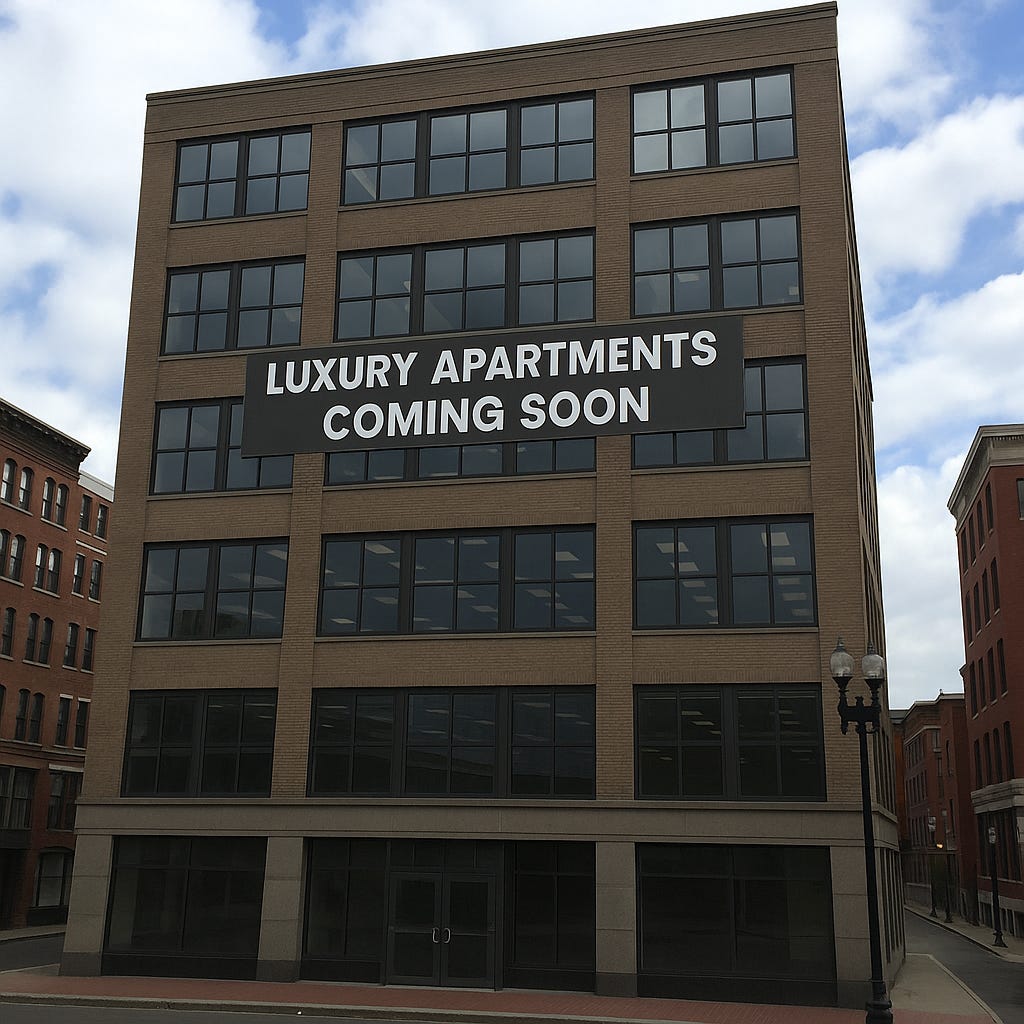MAR, GBREB Miss Opportunity to Stand With Home-buying Consumers
State-owned Land For Sale for Housing | Healey Supports Two Boston Office-to-Housing Conversions
EOHLC Releases Final Home Inspection Regulations, Delays Start Date; MAR, GBREB, REBA Choose Quicker Closings and Easier Commissions Over Consumer Protections
When given the opportunity to stand with home-buying consumers and come out in strong support of home inspection protections, the Massachusetts Association of Realtors (MAR), the Greater Boston Real Estate Board, and the Real Estate Bar Association (REBA) called for changes to water down and delay proposed regulations.
Given the beating the industry's reputation has taken from lawsuits by class-action attorneys and the U.S. Department of Justice over the past few years, one would think that state and local Realtor Associations would jump at the chance to support reasonable consumer protection.
The Massachusetts Executive Office of Housing and Livable Communities (EOHLC) capitulated, to some extent, and released the final regulations on June 6, 2025. The EOHLC delayed the effective date until October 15, 2025. The rules will not apply to Contracts to Purchase or Purchase and Sale Agreements signed on or before October 15, 2025.
Real estate professionals and attorneys who understand and take seriously the concept of fiduciary responsibility are supportive of consumer protections surrounding home inspections.
The regulations are the result of legislation passed in August 2024 as part of a housing bond bill. The law mandated that the EOHLC implement rules ensuring home inspection rights for buyers. The proposed regulations released on April 25, 2025, represented a long-overdue step to protect homebuyers, especially first-time and moderate-income buyers, from being pressured into waiving vital due diligence. The EOHLC conducted a 21-day public comment period.
While REBA and state and local real estate associations argued the proposed rules were disruptive and overbroad, their positions prioritized transactional efficiency and professional liability concerns over the public interest and the intent of the law: safeguarding consumers in the most significant financial transaction of their lives.
REBA, in its six-page letter, expressed it was "deeply concerned that the proposed Regulations are overly broad, conflict with well-established case law, and risk destabilizing an already fragile real estate market, thereby causing significant financial harm to consumers." Among other things, REBA argued for allowing home buyers to waive inspections post-offer and to maintain "aggregate" clauses in offers that allow for termination only if the repair costs exceed a specified threshold.
While waiving post-offer inspections and aggregate clauses are acceptable industry practices, these mechanisms can defeat the spirit of buyer protection. The proposed regulations rightly questioned whether such practices render inspections "meaningless." Without a doubt, these aggregate clauses may lead homebuyers to feel pressured by real estate agents to include cost thresholds that are so high that an inspection is meaningless.
For example, homebuyers could make an offer and state that they will not back out or request post-inspection concessions unless the amount of non-cosmetic issues exceeds $50,000 on a $500,000 home. That's essentially waiving a home inspection.
The EOHLC changed the proposed regulations, making aggregate clauses permissible: "... a Seller and Prospective Purchaser (a) may agree to limit a Proposed Purchaser's choice not to proceed with the transaction after a Home Inspection if the estimated aggregate cost of repairs does not exceed a reasonable monetary threshold agreed upon by the parties ..."
The EOHLC should have defined "reasonable" as a monetary threshold of 2 percent or less of the purchase price. For example, a cost threshold of $12,000 or less on a $600,000 offer to purchase would be reasonable.
In a statement, the Healey-Driscoll Administration proclaimed the new state policy "protects homebuyers' rights to a home inspection and serves as a leading example of home inspection protections for homebuyers in the country."
The regulation requires sellers to provide a separate written disclosure informing buyers that acceptance of their offer is not contingent upon waiving a home inspection and that the buyer may choose to have the home inspected. The EOHLC will develop a standard disclosure form. The final regulation makes it clear that if a person acting in a business context fails to provide the required disclosure, it constitutes a violation of the consumer protection law. Embedding the disclosure in the Contract to Purchase is likely the most effective way to ensure homebuyers are informed. Bolding the language would be preferred.
The regulation also "includes a limited exemption for pre-sales of newly constructed homes" if the parties sign the "purchase contract ... before substantial completion, and the seller offers at minimum a one-year express written warranty." The Healey-Driscoll Administration believes such an exemption will "support new housing construction across the state" and help "builders secure additional financing to build more units without delay."
For at least the past six years, Greater Boston homebuyers have faced increasing pressure to skip home inspections to make their offers more competitive. Inspections are crucial. An inspector may uncover potential issues, preventing unexpected costs and providing peace of mind when making a significant financial decision. They also empower buyers to negotiate a fair price.
State Offers Developers 450 Acres Hoping to Produce 3,500 Housing Units
The Healey-Driscoll Administration has identified more than 450 acres of surplus state-owned land in Massachusetts that could be developed into 3,500 new housing units by developers.
The inventory, compiled over the past year, includes sites in more than 20 municipalities, according to a statement released June 2, 2025. State officials plan to make 17 additional parcels available to developers over the next year, including 10 offered through formal Requests for Proposals and seven auctioned in September 2025.
Governor Maura Healey, Lieutenant Governor Kim Driscoll, and other senior administration officials presented the findings to housing developers during a meeting in Boston. The inventory effort followed an executive order signed by Healey directing three state agencies — the Executive Office of Housing and Livable Communities, the Executive Office for Administration and Finance, and the Division of Capital Asset Management and Maintenance — to identify underused state properties suitable for housing development.
The review excluded environmentally sensitive areas, including protected open spaces, wetlands, and floodplains. The initiative is part of a broader strategy to increase housing supply in Massachusetts.
Several development projects on surplus state land are already underway, with more than 1,500 units currently in planning or construction phases, according to the state officials.
With Commercial Property Values Falling in Boston, State Steps Up Support for Office Building Conversions to Housing.
The Healey-Driscoll Administration announced on June 4, 2025, that the Commonwealth would use that $7.4 million in state funding to convert two office buildings in downtown Boston into nearly 200 new housing units.
The initiative is part of a broader push to address Massachusetts' housing shortage by repurposing underused commercial spaces. Contrarian Boston has extensively covered the struggling office building market in Boston.
The lack of new housing units in Boston has become a key campaign issue in the city's mayoral race. Democratic candidate Josh Kraft states on his website, "... there are more than 26,000 housing units that have been permitted through the community and city process and ready for construction but are not financially viable under the Wu Administration's mandates. In addition to the jobs and housing units these would produce, they would generate an estimated $100 [million] to $125 [million] in new tax revenue annually."
Key Details of the Funding Awards:
31 Milk Street (16-18 Hawley Street):
Awarded $4 million
Will create 110 rental units
22 units will be income-restricted
15 Court Square:
Awarded $3.4 million
Will create 80 rental units
16 units will be income-restricted
Program Background and Goals:
Funded through the Commercial Conversion Program, created under the Affordable Homes Act.
Targets vacant or underused commercial buildings for residential or mixed-use redevelopment.
Focuses on properties with existing infrastructure near downtowns and public services.
Additional support from the City of Boston:
Both projects received assistance from the city's Office to Residential Conversion Program, launched in October 2023.
Offers tax incentives for conversions that meet zoning and energy standards.
Currently reviewing 15 applications to convert 20 Class B and C office buildings into 762 homes, including 139 income-restricted units.
The Healey-Driscoll Administration anticipates awarding additional taxpayer funds later this year under the Commercial Conversion Program.




